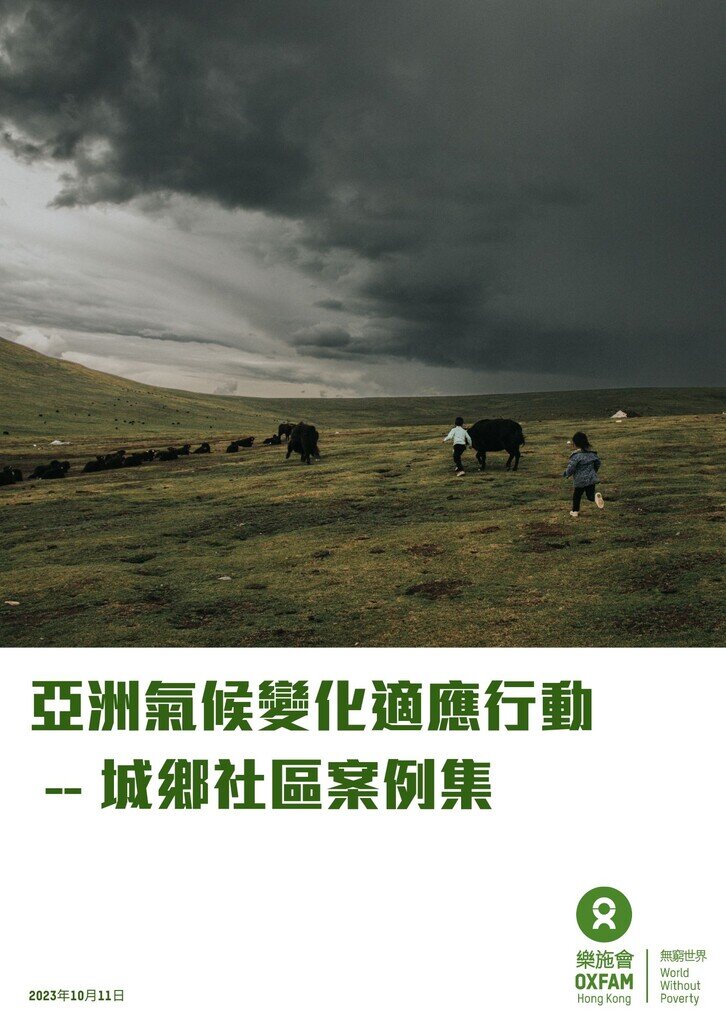11 OCT 2023
Oxfam Hong Kong releases the Case Study on 'Climate Adaptation in Asia - Local Actions of Eight Urban and Rural Communities' before the upcoming UN Climate Change Conference
Oxfam Hong Kong (OHK) today releases the Case Study on 'Climate Adaptation in Asia - Local Actions of Eight Urban and Rural Communities’, on the eve of 2023 United Nations Climate Change Conference (COP28) to be held in Dubai next month. The Study analyses how eight vulnerable communities in Asia have been fighting and adapting to a wide range of climate risks.
OHK hopes that the analysis will help increase the understanding of international community about climate adaptation, and also mobilise resources for vulnerable communities affected by climate change.
In recent years, the climate impacts brought about by greater frequency and intensity of extreme weather in different regions have become more evident, resulting in greater public awareness and recognition of the need for climate adaptation work.
Case Study of Eight Urban and Rural Communities
The Case Study on 'Climate Adaptation in Asia - Local Actions of Eight Urban and Rural Communities' published by OHK is a joint effort of OHK and its partner organisations in Hong Kong, Mainland China and other Asian countries and regions in the past few years.
This research aims to provide a profound understanding of climate risks and challenges faced by local communities and their corresponding actions taken to cope with different climate change situations.
One example highlighted in the report is Wangjinzhuang Village in Hebei Province - an area characterised by tall mountains, steep slopes and beautiful terraced fields created out of the wisdom of the predecessors for planting millets, corn and beans. Frequent extreme weather conditions, such as droughts, heavy rainstorms, and persistent low temperatures, have led to crop failures. With the support of OHK and its partner organisation, villagers have learned to plant a great variety of seeds. A community seed bank was also established to identify, preserve and improve the quality of 171 local varieties of seeds to guarantee a stable supply of crops even in extreme climates.
Another example is Baitaidi, a mountainous area in Nepal, where heavy rainstorms have prevailed more frequently and intensively to increase the risk of landslides. Unstable rainfall and high temperature have also affected crop harvests. To help local people avoid such crises and casualties, OHK collaborated with local experts in developing a landslide-warning mobile app to inform residents of high landslide risks, thereby mitigating potential disasters.
The case study also covers climate challenges in Hong Kong, particularly with subdivided housing communities, where residents face health issues due to extreme heat and poor living conditions. A senior lady, who lives in a low storey unit with only one window looking out to a wall of a nearby building only a few centimeters away, having health concerns of serious rubbish and rat problems at home. OHK has advocated for cooperation with the voluntary groups to open shared spaces and partnered with mini-storage companies to provide free storage for household items, improving living conditions for these residents.
Vulnerable Communities Face Greater Risks from Climate Disasters
OHK has always been committed to eliminating poverty and social inequalities. In the context of climate change, OHK pays particularly close attention to the risks and impacts faced by impoverished communities and their resources and abilities in responding to climate challenges. These communities are affected by climate disasters, disrupting their daily lives and livelihood.
Kalina Tsang, Director General of Oxfam Hong Kong, said, ‘Communities and groups least responsible for greenhouse gas emissions bear the greatest impact and pay the greatest price for climate change. This highlights the importance of promoting climate justice. And we believe a justice climate policy should include the approach of "emission reduction" and "adaptation".’
Rich Countries’ Responsibilities in Climate Justice
In response to climate justice, OHK continues to urge global stakeholders, especially developed and affluent countries and those with higher emissions responsibility, to collectively reduce greenhouse gas emissions and mitigate climate change, aiming to limit global warming to below 1.5°C by 2050. Additionally, rich countries must significantly increase funding for climate adaptation vulnerable areas, and use grant-based financing to allow local communities, civil society organisations and local governments take the lead in making decisions about how to use it, particularly in tackling the needs of women and girls to truly help the poor.
OHK plans to share and discuss the case study with partners, including civil society organisations and representatives from other countries and regions, during related meetings at the UN Climate Change Conference. The goal is to share stakeholders with wisdom from the ground, and strive for climate justice for vulnerable communities affected by climate change.
Climate Change Photography Exhibition
In addition to publishing the case study, OHK will hold ‘Know Heaven, Know Earth: Oxfam Hong Kong Climate Change Photography Exhibition’ at TKO Plaza for a week, from today onwards, showcasing photos taken in the above-mentioned areas to allow the public to understand how different communities in Asia face and adapt to climate change.
- End -
About Oxfam
Oxfam is a global organisation committed to creating a world without poverty through its advocacy, development and humanitarian work.
For media enquiries, please contact:
| Roni Chan Senior Communications Officer Oxfam Hong Kong Phone: +852 3120 5222 Email: [email protected] | Vicky Wong Communications Officer Oxfam Hong Kong Phone: +852 3120 5281 Email: [email protected] |


















